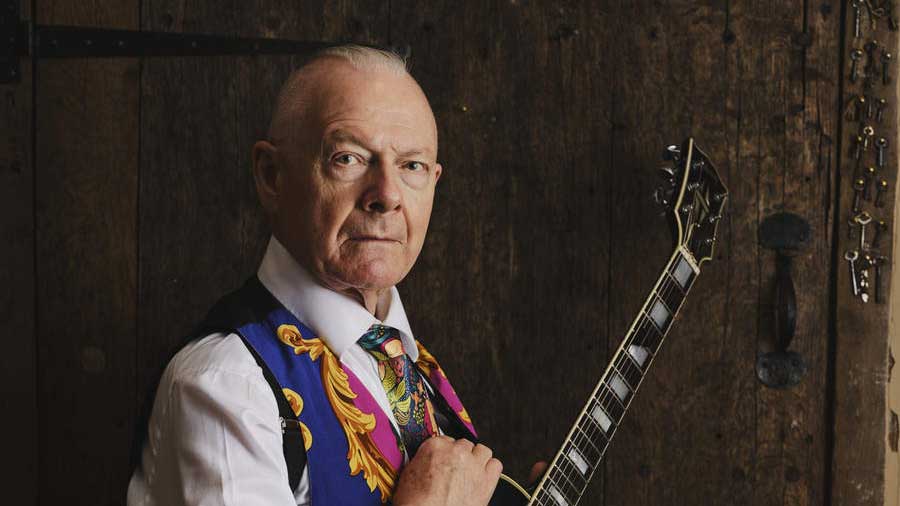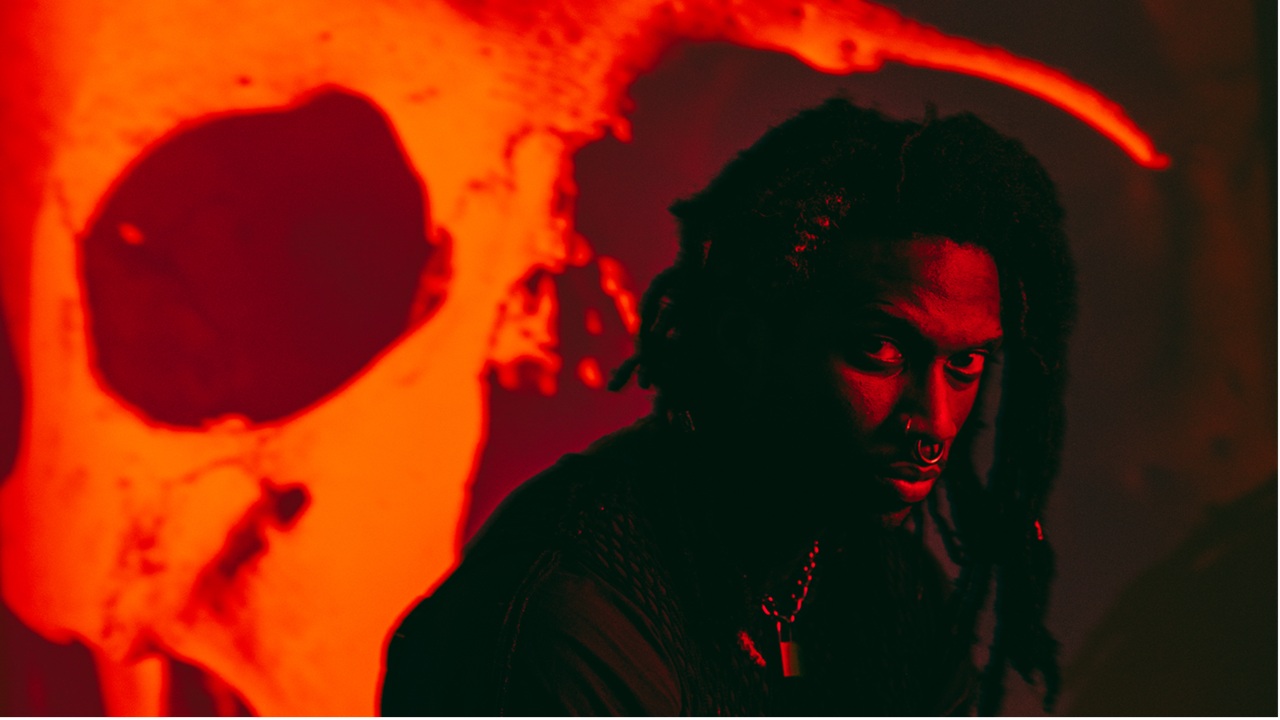Robert Fripp: "Why didn’t I become a blues guitarist? Probably because I wasn’t a very good blues guitarist"
King Crimson co-founder Robert Fripp on choosing guitar, musical influences, band principles and heartbreaking departures

Select the newsletters you’d like to receive. Then, add your email to sign up.
You are now subscribed
Your newsletter sign-up was successful
Want to add more newsletters?

Every Friday
Louder
Louder’s weekly newsletter is jam-packed with the team’s personal highlights from the last seven days, including features, breaking news, reviews and tons of juicy exclusives from the world of alternative music.

Every Friday
Classic Rock
The Classic Rock newsletter is an essential read for the discerning rock fan. Every week we bring you the news, reviews and the very best features and interviews from our extensive archive. Written by rock fans for rock fans.

Every Friday
Metal Hammer
For the last four decades Metal Hammer has been the world’s greatest metal magazine. Created by metalheads for metalheads, ‘Hammer takes you behind the scenes, closer to the action, and nearer to the bands that you love the most.

Every Friday
Prog
The Prog newsletter brings you the very best of Prog Magazine and our website, every Friday. We'll deliver you the very latest news from the Prog universe, informative features and archive material from Prog’s impressive vault.
Robert Fripp is difficult to get hold of. One of rock’s most idiosyncratic figures and one of the chief architects of progressive rock via King Crimson, he rarely gives interviews, and prompts a mix of memories from past and present bandmates.
Today he’s the sole remaining founding member of Crimson, who recently were the subject of the compelling documentary film In The Court Of The Crimson King: King Crimson At 50.
Now, with Crimson on another hiatus, Fripp has thrown himself into other things. Last year he reissued his 1979 solo album Exposure. He and wife Toyah Wilcox have continued to delight and confound with their Sunday Lunch streams; a surreal, unprecedented dive into the daft for a man with a reputation as serious, impenetrable. But where did it all begin?

How did you become interested in music – and the guitar – in the first place?
At age eleven my sister and I bought two records: Rock With The Caveman by Tommy Steele, and Don’t Be Cruel by Elvis Presley. There weren’t any English rock musicians, they were all jazzers – old men, basically. In America it was entirely different. There was nothing demeaning about playing rock music and moving out of blues. Scotty Moore, Chuck Berry, the sheer power of Jerry Lee Lewis.
At thirteen, trad jazz came along. I would go down to the Winter Gardens in Bournemouth and see all the characters: Chris Barber, Acker Bilk, Monty Sunshine… It segued into The Beatles and 1960s English rock instrumentals. When I was seventeen I saw The Outlaws at a show in Poole, with Ritchie Blackmore. He was then eighteen. He was phenomenal. He had the music, he had the playing, it was astonishing.
Was there an influence on you musically from listening to classical music?
Sign up below to get the latest from Classic Rock, plus exclusive special offers, direct to your inbox!
I began listening to the Bartók String Quartet and Stravinsky’s The Rite Of Spring. The turning point in my musical, and I suppose personal, life was something like ‘music is one’. I didn’t hear separate categories, I heard music as if it was one musician speaking in a variety of dialects.
There isn’t a great deal of blues influence in your playing.
Why didn’t I become a blues guitarist? Probably because I wasn’t a very good blues guitarist. The thing is, a lot of young players, and some established players, have said to me: “I only wanted to be like Clapton.” They didn’t say it, but you knew it. That wasn’t my aim. Stunning player, but…
The question eventually became formulated for me as: “What would Hendrix sound like playing the Bartók String Quartets?” In 1969 the major musical influences in Crimson were [multi-instrumentalist] Ian McDonald and [drummer] Michael Giles.
How did McDonald and Giles’s influence connect with you in Crimson’s early days?
In the studio recording [debut album] In The Court Of The Crimson King, they would make a comment, [and] I would adjust my response to sit in accord with theirs. Then when they left it was heartbreaking for me, because although Giles wasn’t a writer his contributions to the arrangements and direction were stunning.
My primary role for In the Court in Crimson in 1969, as I saw it, was to come up with guitar parts that supported the writing. Although you could say that McDonald and [lyricist Peter] Sinfield were the main writers, you can’t really exclude anyone from that; it was five people. For me, Crimson has always been a co-operative, which it certainly was in 1969.
That led to some turbulence within the band, didn’t it?
My personal difficulties with any Crimson musician since have been if they favour themselves or see themselves as somehow coming ahead of the other players, or the music. The music comes first, principle one. Principle two: the band comes first. The interests of the band come ahead of the interests of the other players. Three: we share the money.
Why do there seem to be personal difficulties? Look at those three principles, and that’s the clue to anything that follows. If the music does come first, then all the names are there at the top. We shared the record royalties, we shared the publishing royalties.
Last year’s Exposure box set includes Steven Wilson remixes of your solo material. As with the Crimson remixes he’s done, they’re remarkably faithful to the originals.
Steven’s aim was very faithfully to reproduce the original but with modern technology. There had been the odd discussions. For example, with Lizard there were one or two things we didn’t quite put in, and so on. My view on occasion has been that we actually didn’t get it right the first time, so now is an opportunity. Then you say: “What’s right and what’s wrong?”
In terms of Exposure, I was very up for complete re-imagining. Steven [says]: “No, this is a classic.” That desk [pointing to an antique writing desk in the room in which we are sitting] is an 1830s desk. It’s a classic of its kind. If I were designing a desk to use with modern things, such as having computers on the side, it wouldn’t be designed like that. However, for me that is the classic and I’m not going to redesign it. That’s Steven’s point of view.
Revisiting Exposure, was it possible to see a stylistic link between Crimson albums Red from the mid-seventies and Discipline from the early eighties? Was this an idea forming in your mind during Crimson’s hiatus in the late seventies?
Was it Steve Reich? Was it Philip Glass? Was it Robert Fripp? Was it world music? Anyway, all of this, my thinking, my academic interests and approach to music were in place in 1980, 1981, with the coming together of that form of King Crimson.
I met Adrian [Belew, guitarist/ vocalist] personally at The Bottom Line in New York when I went down to see Steve Reich. Bowie was there with Adrian. We went over and said hello and Adrian said: “Let’s get together for tea tomorrow.” So we did. That’s how our personal connection began.
King Crimson: In the Court of the Crimson King - King Crimson at 50 is out now on CD and DVD. For a more in-depth version of this interview, visit Guitarist.
With over 30 years’ experience writing for guitar magazines, including at one time occupying the role of editor for Guitarist and Guitar Techniques, David is also the best-selling author of a number of guitar books for Sanctuary Publishing, Music Sales, Mel Bay and Hal Leonard. As a player he has performed with blues sax legend Dick Heckstall-Smith, played rock ’n’ roll in Marty Wilde’s band, duetted with Martin Taylor and taken part in charity gigs backing Gary Moore, Bernie Marsden and Robbie McIntosh, among others. An avid composer of acoustic guitar instrumentals, he has released two acclaimed albums, Nocturnal and Arboretum.

